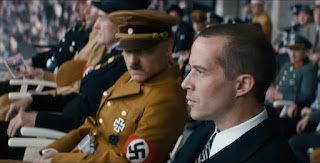This has been so long overdue that many of us even forgot
that the great J C Owens' (Jesse Owens) life was worth a biopic. Set in the
troubled pre-WW II world Race traces the rather swift journey of Jesse Owens
from the lanes of Cleveland to the monster stadium at Berlin.
What should Jesse Owens' biopic be about? Should it be
about his genius, his prowess, his work, his struggles or should it be about
the political backdrop against which he made history? Does the context of his
achievements mean more than the actual achievements themselves? These are the
questions Race leaves in your mind.
Germany is hosting the Olympics and the United States is
not sure whether it wants to be seen
participating. Germany is at the heights
of its discrimination policies and the USA does not want to be perceived as a
pacifist of such policies, in spite of its own chequered discrimination
policies. Germany makes all efforts to make sure it holds a grand games, even
camouflaging their discriminating tendencies for a while and USA nod to
participate.
Back home, the ' black people' of America look at this as
an opportunity to tell the world that their hearts are with the downtrodden
people of Germany. They do not want one of their people going to the games.
There is politics, there is power, there are egos, there is a bit of business,
and in the midst of all this is a bit of athletics. Race somehow contrives to lose its focus from its
protagonist and spread it all over the socio-political state of USA and Germany
without giving a complete picture of any of these.
While it has a sincere performance by its lead man Stephen
James, and is ably supported by an energetic Jason Sudeikis, the movie never
really rests its weight on its two central characters; it is too busy flirting
with greater things. The most important factor behind the making of the world's
greatest athlete(arguably) - the miles and hours he had to put into the track
go missing. The movie makes it seem as if he just had to turn up and run to get
the gold, as if the competition was insignificant! The only time he is ever
pushed is in the long jump final where his adversary (a matured David Kross, if
you remember him from The Reader) shows some rare sportsmanship. Otherwise, the
competition is invisible. The only time Jesse loses anything is when his mind
is not in the right place; otherwise he is invincible. It is this seeming
inevitability of his victories that make Race a not too exciting experience.
The only thing that can make it exciting is the context of what was achieved,
something greater than the sport itself. The political statement that was made
in the face of Adolf Hitler.
But Race does the same thing with Hitler that many movies
have done before - treat him like
Voldemort. His name must not be said, his
face must not be shown. He is just a passing mirage shown at obtuse angles and
referred to as Fuhrer. We really don't understand what was achieved in terms of
a political statement. We only get a stone faced general trying to run the
games with an iron fist and speaking in German monotone.
It is this strewn focus of the film that hurts Race the
most. Of course, you can enjoy the quite well made Olympic portions, even
though the huge crowds look obviously as products of CGI.
One wonders whether a generation who never heard about Owens
before will watch this film and think that he was this incredibly gifted guy
who just happened to be at the right place at the right time and was lucky
enough to be part of history. Ask any athlete and his greatest pride will be
the amount of hours he put in to get to where he was, and never about how
naturally good he was. Race doesn't show the sweat and hours behind the 4 gold
medals, and for that reason remains an underwhelming biopic of one of the
greatest ever athletes.
A story of the circumstances more than the man himself!
2.5/5




No comments:
Post a Comment